Current Issues in Corporate Law
VerifiedAdded on 2023/06/11
|11
|2691
|180
AI Summary
This essay covers the discussion of doctrine of piercing of corporate veil while comparing laws of an overseas jurisdiction with the New Zealand common law approach to piercing the corporate veil.
Contribute Materials
Your contribution can guide someone’s learning journey. Share your
documents today.
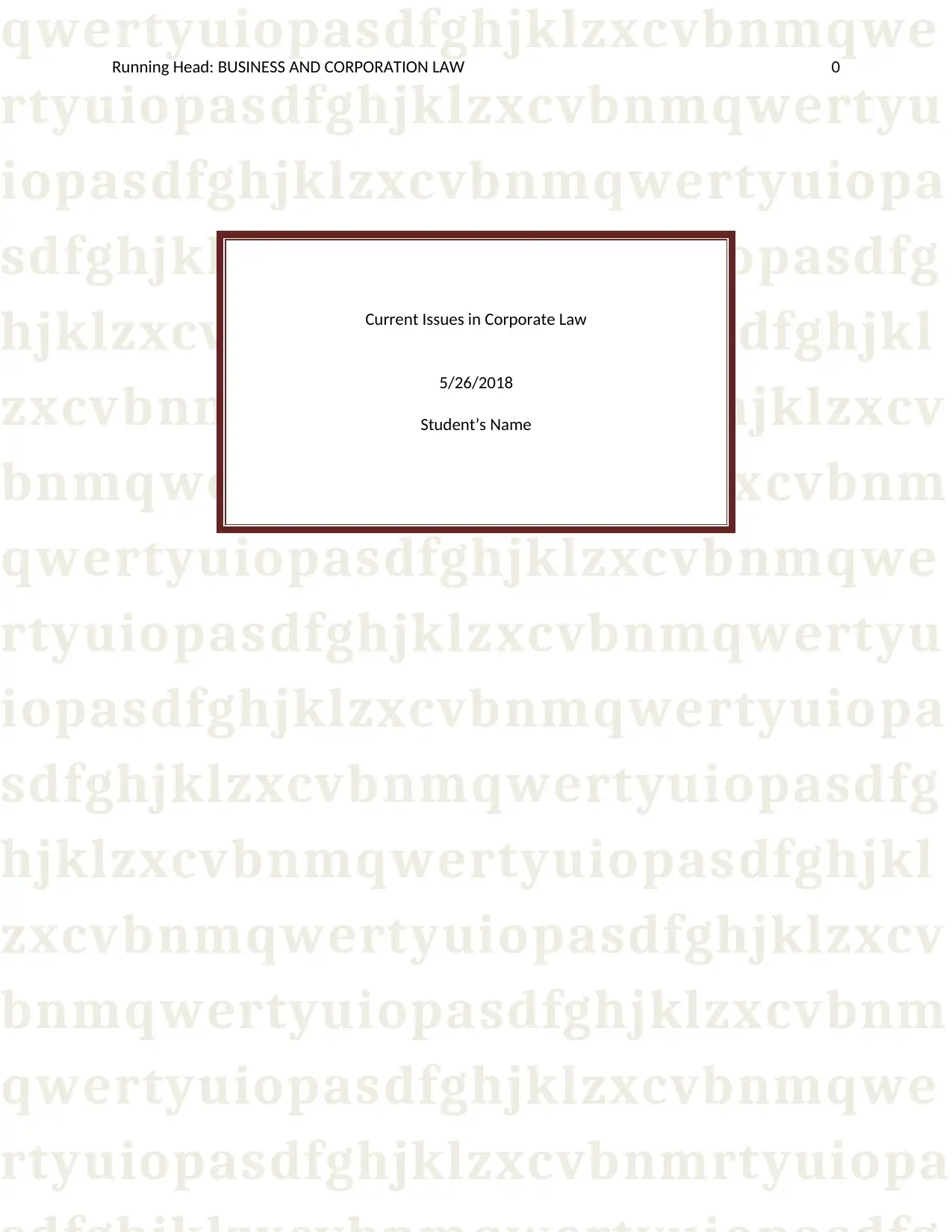
qwertyuiopasdfghjklzxcvbnmqwe
rtyuiopasdfghjklzxcvbnmqwertyu
iopasdfghjklzxcvbnmqwertyuiopa
sdfghjklzxcvbnmqwertyuiopasdfg
hjklzxcvbnmqwertyuiopasdfghjkl
zxcvbnmqwertyuiopasdfghjklzxcv
bnmqwertyuiopasdfghjklzxcvbnm
qwertyuiopasdfghjklzxcvbnmqwe
rtyuiopasdfghjklzxcvbnmqwertyu
iopasdfghjklzxcvbnmqwertyuiopa
sdfghjklzxcvbnmqwertyuiopasdfg
hjklzxcvbnmqwertyuiopasdfghjkl
zxcvbnmqwertyuiopasdfghjklzxcv
bnmqwertyuiopasdfghjklzxcvbnm
qwertyuiopasdfghjklzxcvbnmqwe
rtyuiopasdfghjklzxcvbnmrtyuiopa
Running Head: BUSINESS AND CORPORATION LAW 0
Current Issues in Corporate Law
5/26/2018
Student’s Name
rtyuiopasdfghjklzxcvbnmqwertyu
iopasdfghjklzxcvbnmqwertyuiopa
sdfghjklzxcvbnmqwertyuiopasdfg
hjklzxcvbnmqwertyuiopasdfghjkl
zxcvbnmqwertyuiopasdfghjklzxcv
bnmqwertyuiopasdfghjklzxcvbnm
qwertyuiopasdfghjklzxcvbnmqwe
rtyuiopasdfghjklzxcvbnmqwertyu
iopasdfghjklzxcvbnmqwertyuiopa
sdfghjklzxcvbnmqwertyuiopasdfg
hjklzxcvbnmqwertyuiopasdfghjkl
zxcvbnmqwertyuiopasdfghjklzxcv
bnmqwertyuiopasdfghjklzxcvbnm
qwertyuiopasdfghjklzxcvbnmqwe
rtyuiopasdfghjklzxcvbnmrtyuiopa
Running Head: BUSINESS AND CORPORATION LAW 0
Current Issues in Corporate Law
5/26/2018
Student’s Name
Secure Best Marks with AI Grader
Need help grading? Try our AI Grader for instant feedback on your assignments.
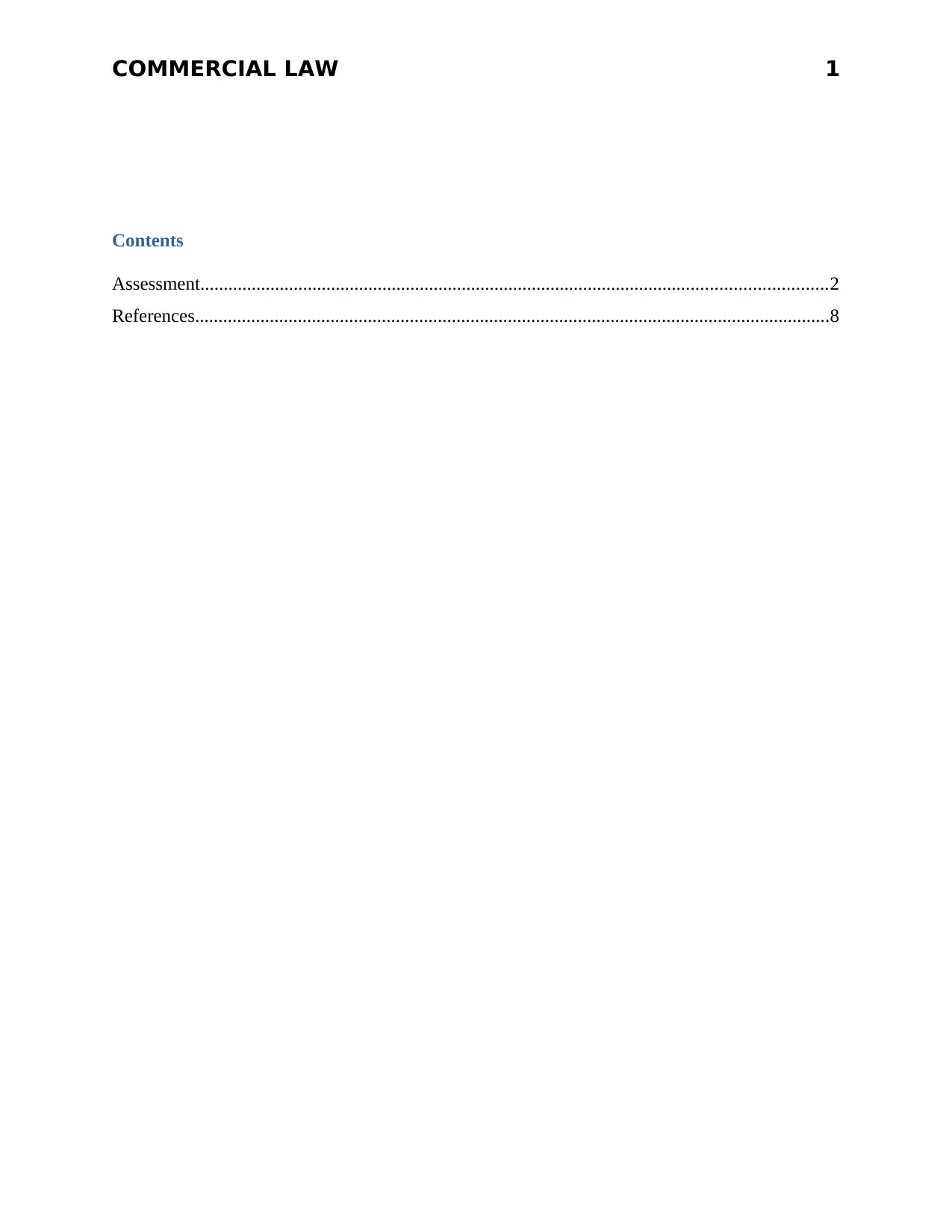
COMMERCIAL LAW 1
Contents
Assessment......................................................................................................................................2
References........................................................................................................................................8
Contents
Assessment......................................................................................................................................2
References........................................................................................................................................8
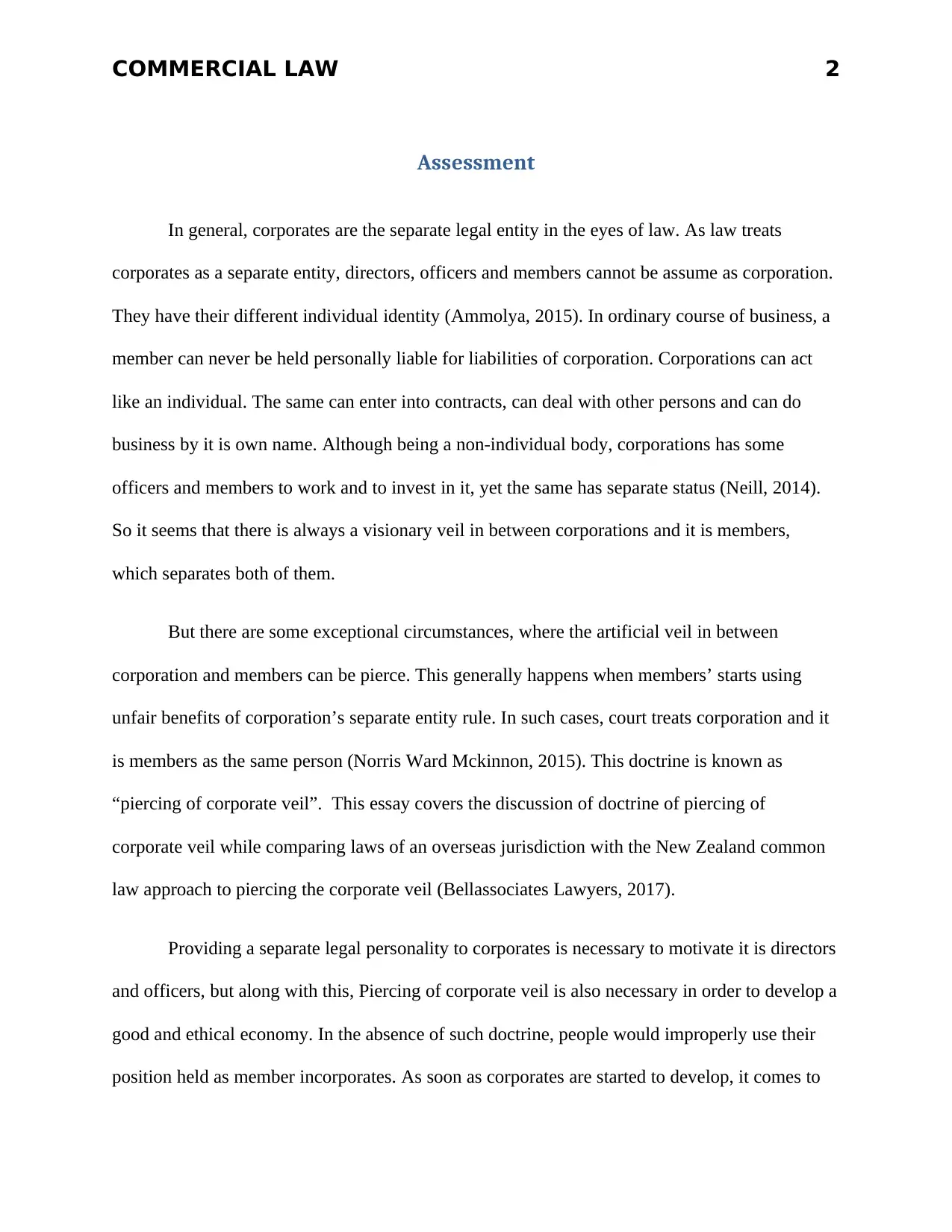
COMMERCIAL LAW 2
Assessment
In general, corporates are the separate legal entity in the eyes of law. As law treats
corporates as a separate entity, directors, officers and members cannot be assume as corporation.
They have their different individual identity (Ammolya, 2015). In ordinary course of business, a
member can never be held personally liable for liabilities of corporation. Corporations can act
like an individual. The same can enter into contracts, can deal with other persons and can do
business by it is own name. Although being a non-individual body, corporations has some
officers and members to work and to invest in it, yet the same has separate status (Neill, 2014).
So it seems that there is always a visionary veil in between corporations and it is members,
which separates both of them.
But there are some exceptional circumstances, where the artificial veil in between
corporation and members can be pierce. This generally happens when members’ starts using
unfair benefits of corporation’s separate entity rule. In such cases, court treats corporation and it
is members as the same person (Norris Ward Mckinnon, 2015). This doctrine is known as
“piercing of corporate veil”. This essay covers the discussion of doctrine of piercing of
corporate veil while comparing laws of an overseas jurisdiction with the New Zealand common
law approach to piercing the corporate veil (Bellassociates Lawyers, 2017).
Providing a separate legal personality to corporates is necessary to motivate it is directors
and officers, but along with this, Piercing of corporate veil is also necessary in order to develop a
good and ethical economy. In the absence of such doctrine, people would improperly use their
position held as member incorporates. As soon as corporates are started to develop, it comes to
Assessment
In general, corporates are the separate legal entity in the eyes of law. As law treats
corporates as a separate entity, directors, officers and members cannot be assume as corporation.
They have their different individual identity (Ammolya, 2015). In ordinary course of business, a
member can never be held personally liable for liabilities of corporation. Corporations can act
like an individual. The same can enter into contracts, can deal with other persons and can do
business by it is own name. Although being a non-individual body, corporations has some
officers and members to work and to invest in it, yet the same has separate status (Neill, 2014).
So it seems that there is always a visionary veil in between corporations and it is members,
which separates both of them.
But there are some exceptional circumstances, where the artificial veil in between
corporation and members can be pierce. This generally happens when members’ starts using
unfair benefits of corporation’s separate entity rule. In such cases, court treats corporation and it
is members as the same person (Norris Ward Mckinnon, 2015). This doctrine is known as
“piercing of corporate veil”. This essay covers the discussion of doctrine of piercing of
corporate veil while comparing laws of an overseas jurisdiction with the New Zealand common
law approach to piercing the corporate veil (Bellassociates Lawyers, 2017).
Providing a separate legal personality to corporates is necessary to motivate it is directors
and officers, but along with this, Piercing of corporate veil is also necessary in order to develop a
good and ethical economy. In the absence of such doctrine, people would improperly use their
position held as member incorporates. As soon as corporates are started to develop, it comes to
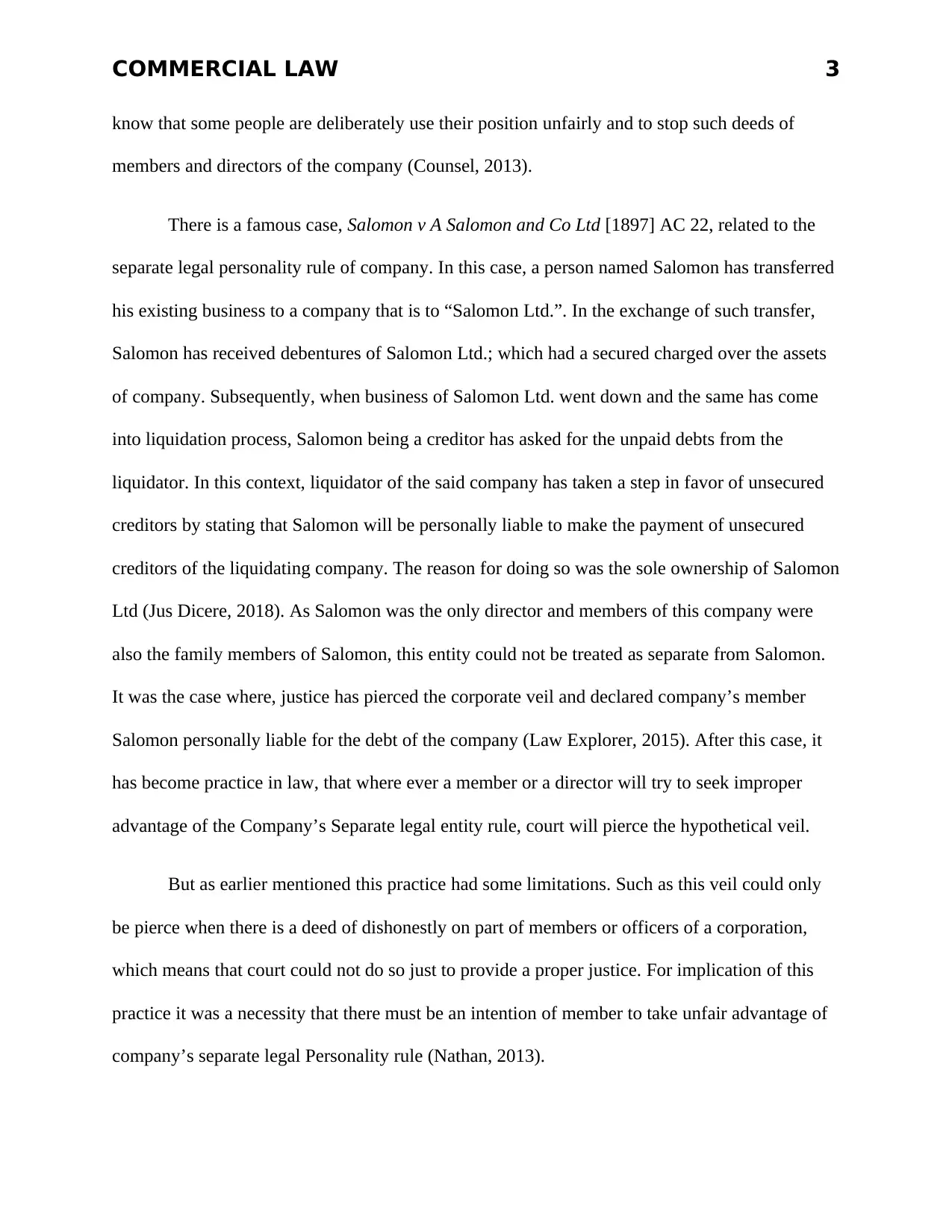
COMMERCIAL LAW 3
know that some people are deliberately use their position unfairly and to stop such deeds of
members and directors of the company (Counsel, 2013).
There is a famous case, Salomon v A Salomon and Co Ltd [1897] AC 22, related to the
separate legal personality rule of company. In this case, a person named Salomon has transferred
his existing business to a company that is to “Salomon Ltd.”. In the exchange of such transfer,
Salomon has received debentures of Salomon Ltd.; which had a secured charged over the assets
of company. Subsequently, when business of Salomon Ltd. went down and the same has come
into liquidation process, Salomon being a creditor has asked for the unpaid debts from the
liquidator. In this context, liquidator of the said company has taken a step in favor of unsecured
creditors by stating that Salomon will be personally liable to make the payment of unsecured
creditors of the liquidating company. The reason for doing so was the sole ownership of Salomon
Ltd (Jus Dicere, 2018). As Salomon was the only director and members of this company were
also the family members of Salomon, this entity could not be treated as separate from Salomon.
It was the case where, justice has pierced the corporate veil and declared company’s member
Salomon personally liable for the debt of the company (Law Explorer, 2015). After this case, it
has become practice in law, that where ever a member or a director will try to seek improper
advantage of the Company’s Separate legal entity rule, court will pierce the hypothetical veil.
But as earlier mentioned this practice had some limitations. Such as this veil could only
be pierce when there is a deed of dishonestly on part of members or officers of a corporation,
which means that court could not do so just to provide a proper justice. For implication of this
practice it was a necessity that there must be an intention of member to take unfair advantage of
company’s separate legal Personality rule (Nathan, 2013).
know that some people are deliberately use their position unfairly and to stop such deeds of
members and directors of the company (Counsel, 2013).
There is a famous case, Salomon v A Salomon and Co Ltd [1897] AC 22, related to the
separate legal personality rule of company. In this case, a person named Salomon has transferred
his existing business to a company that is to “Salomon Ltd.”. In the exchange of such transfer,
Salomon has received debentures of Salomon Ltd.; which had a secured charged over the assets
of company. Subsequently, when business of Salomon Ltd. went down and the same has come
into liquidation process, Salomon being a creditor has asked for the unpaid debts from the
liquidator. In this context, liquidator of the said company has taken a step in favor of unsecured
creditors by stating that Salomon will be personally liable to make the payment of unsecured
creditors of the liquidating company. The reason for doing so was the sole ownership of Salomon
Ltd (Jus Dicere, 2018). As Salomon was the only director and members of this company were
also the family members of Salomon, this entity could not be treated as separate from Salomon.
It was the case where, justice has pierced the corporate veil and declared company’s member
Salomon personally liable for the debt of the company (Law Explorer, 2015). After this case, it
has become practice in law, that where ever a member or a director will try to seek improper
advantage of the Company’s Separate legal entity rule, court will pierce the hypothetical veil.
But as earlier mentioned this practice had some limitations. Such as this veil could only
be pierce when there is a deed of dishonestly on part of members or officers of a corporation,
which means that court could not do so just to provide a proper justice. For implication of this
practice it was a necessity that there must be an intention of member to take unfair advantage of
company’s separate legal Personality rule (Nathan, 2013).
Secure Best Marks with AI Grader
Need help grading? Try our AI Grader for instant feedback on your assignments.
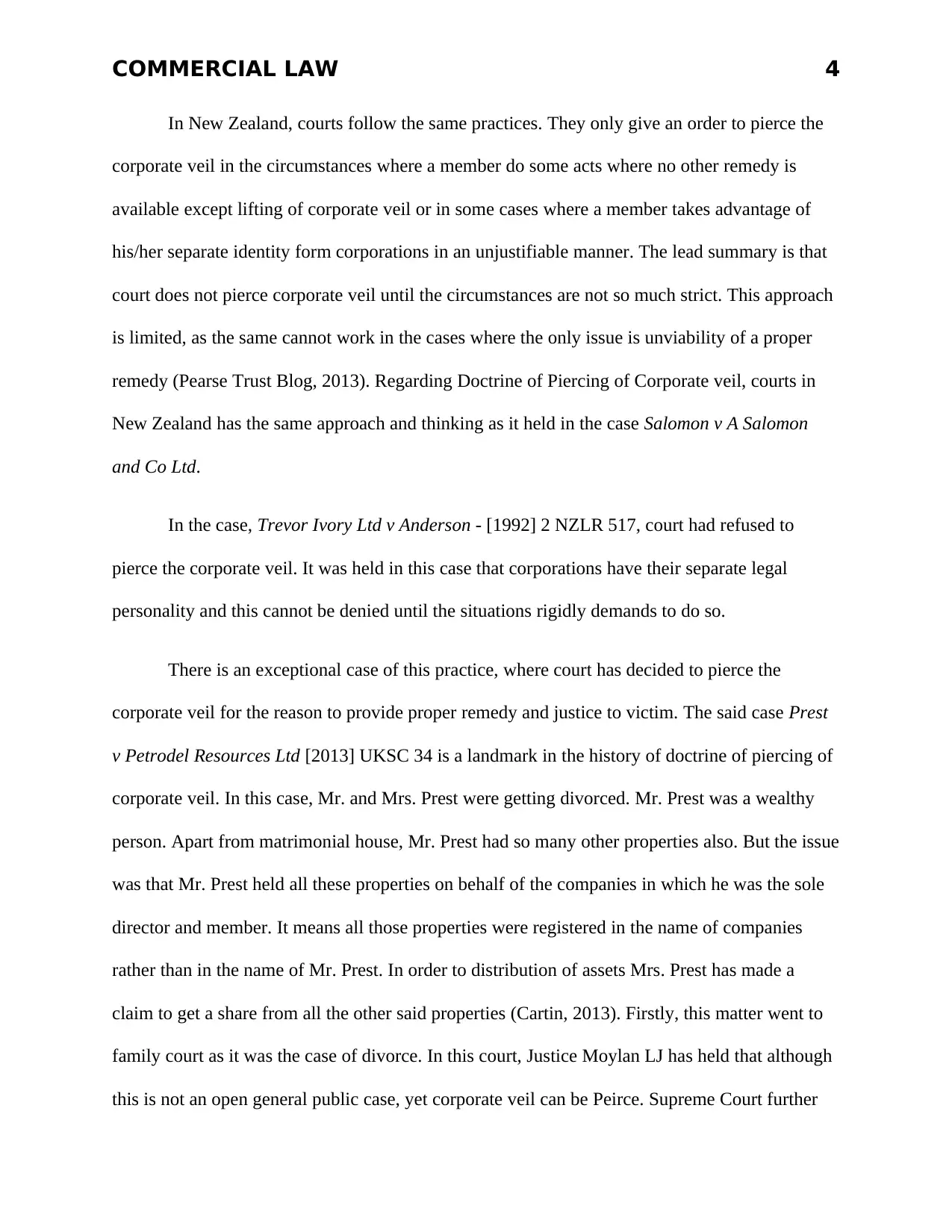
COMMERCIAL LAW 4
In New Zealand, courts follow the same practices. They only give an order to pierce the
corporate veil in the circumstances where a member do some acts where no other remedy is
available except lifting of corporate veil or in some cases where a member takes advantage of
his/her separate identity form corporations in an unjustifiable manner. The lead summary is that
court does not pierce corporate veil until the circumstances are not so much strict. This approach
is limited, as the same cannot work in the cases where the only issue is unviability of a proper
remedy (Pearse Trust Blog, 2013). Regarding Doctrine of Piercing of Corporate veil, courts in
New Zealand has the same approach and thinking as it held in the case Salomon v A Salomon
and Co Ltd.
In the case, Trevor Ivory Ltd v Anderson - [1992] 2 NZLR 517, court had refused to
pierce the corporate veil. It was held in this case that corporations have their separate legal
personality and this cannot be denied until the situations rigidly demands to do so.
There is an exceptional case of this practice, where court has decided to pierce the
corporate veil for the reason to provide proper remedy and justice to victim. The said case Prest
v Petrodel Resources Ltd [2013] UKSC 34 is a landmark in the history of doctrine of piercing of
corporate veil. In this case, Mr. and Mrs. Prest were getting divorced. Mr. Prest was a wealthy
person. Apart from matrimonial house, Mr. Prest had so many other properties also. But the issue
was that Mr. Prest held all these properties on behalf of the companies in which he was the sole
director and member. It means all those properties were registered in the name of companies
rather than in the name of Mr. Prest. In order to distribution of assets Mrs. Prest has made a
claim to get a share from all the other said properties (Cartin, 2013). Firstly, this matter went to
family court as it was the case of divorce. In this court, Justice Moylan LJ has held that although
this is not an open general public case, yet corporate veil can be Peirce. Supreme Court further
In New Zealand, courts follow the same practices. They only give an order to pierce the
corporate veil in the circumstances where a member do some acts where no other remedy is
available except lifting of corporate veil or in some cases where a member takes advantage of
his/her separate identity form corporations in an unjustifiable manner. The lead summary is that
court does not pierce corporate veil until the circumstances are not so much strict. This approach
is limited, as the same cannot work in the cases where the only issue is unviability of a proper
remedy (Pearse Trust Blog, 2013). Regarding Doctrine of Piercing of Corporate veil, courts in
New Zealand has the same approach and thinking as it held in the case Salomon v A Salomon
and Co Ltd.
In the case, Trevor Ivory Ltd v Anderson - [1992] 2 NZLR 517, court had refused to
pierce the corporate veil. It was held in this case that corporations have their separate legal
personality and this cannot be denied until the situations rigidly demands to do so.
There is an exceptional case of this practice, where court has decided to pierce the
corporate veil for the reason to provide proper remedy and justice to victim. The said case Prest
v Petrodel Resources Ltd [2013] UKSC 34 is a landmark in the history of doctrine of piercing of
corporate veil. In this case, Mr. and Mrs. Prest were getting divorced. Mr. Prest was a wealthy
person. Apart from matrimonial house, Mr. Prest had so many other properties also. But the issue
was that Mr. Prest held all these properties on behalf of the companies in which he was the sole
director and member. It means all those properties were registered in the name of companies
rather than in the name of Mr. Prest. In order to distribution of assets Mrs. Prest has made a
claim to get a share from all the other said properties (Cartin, 2013). Firstly, this matter went to
family court as it was the case of divorce. In this court, Justice Moylan LJ has held that although
this is not an open general public case, yet corporate veil can be Peirce. Supreme Court further
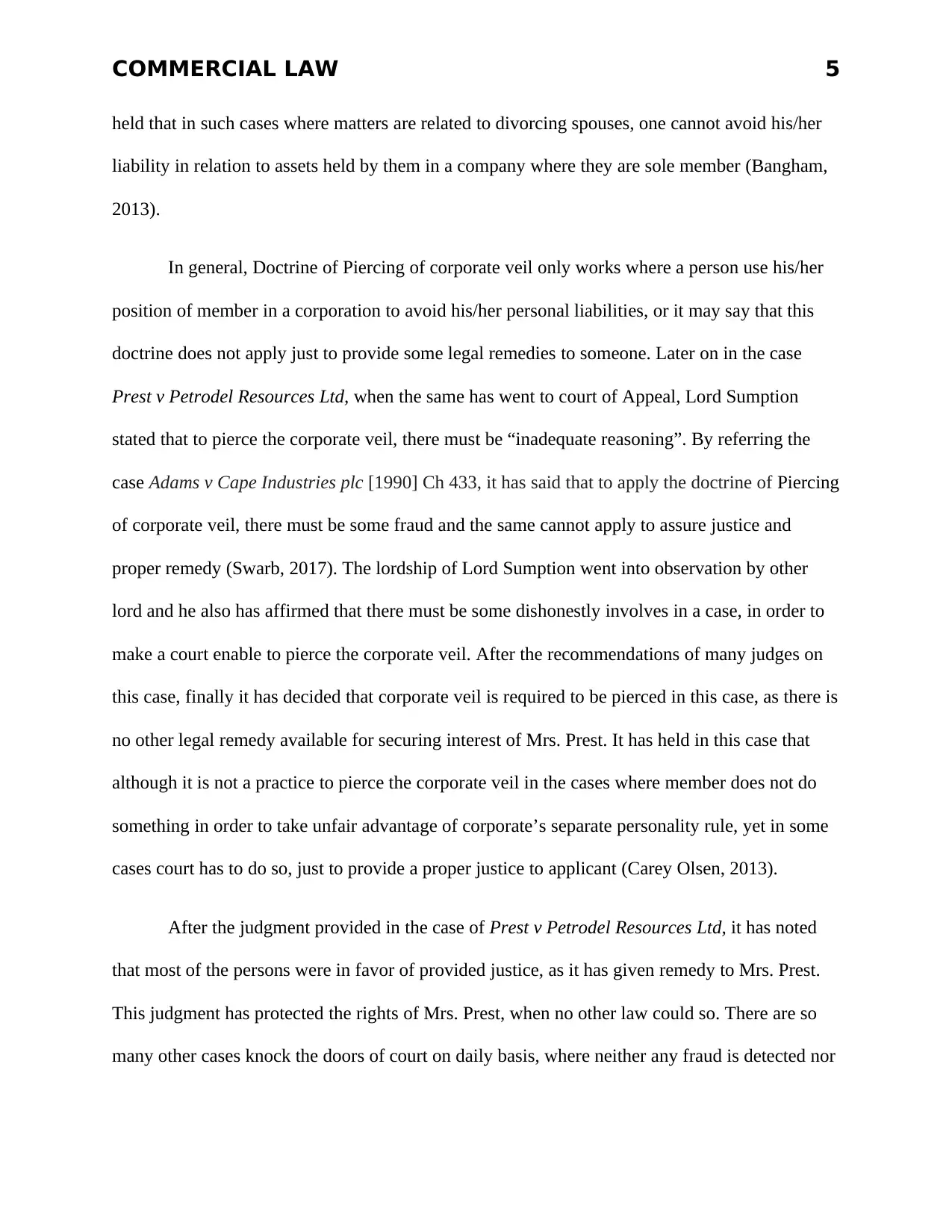
COMMERCIAL LAW 5
held that in such cases where matters are related to divorcing spouses, one cannot avoid his/her
liability in relation to assets held by them in a company where they are sole member (Bangham,
2013).
In general, Doctrine of Piercing of corporate veil only works where a person use his/her
position of member in a corporation to avoid his/her personal liabilities, or it may say that this
doctrine does not apply just to provide some legal remedies to someone. Later on in the case
Prest v Petrodel Resources Ltd, when the same has went to court of Appeal, Lord Sumption
stated that to pierce the corporate veil, there must be “inadequate reasoning”. By referring the
case Adams v Cape Industries plc [1990] Ch 433, it has said that to apply the doctrine of Piercing
of corporate veil, there must be some fraud and the same cannot apply to assure justice and
proper remedy (Swarb, 2017). The lordship of Lord Sumption went into observation by other
lord and he also has affirmed that there must be some dishonestly involves in a case, in order to
make a court enable to pierce the corporate veil. After the recommendations of many judges on
this case, finally it has decided that corporate veil is required to be pierced in this case, as there is
no other legal remedy available for securing interest of Mrs. Prest. It has held in this case that
although it is not a practice to pierce the corporate veil in the cases where member does not do
something in order to take unfair advantage of corporate’s separate personality rule, yet in some
cases court has to do so, just to provide a proper justice to applicant (Carey Olsen, 2013).
After the judgment provided in the case of Prest v Petrodel Resources Ltd, it has noted
that most of the persons were in favor of provided justice, as it has given remedy to Mrs. Prest.
This judgment has protected the rights of Mrs. Prest, when no other law could so. There are so
many other cases knock the doors of court on daily basis, where neither any fraud is detected nor
held that in such cases where matters are related to divorcing spouses, one cannot avoid his/her
liability in relation to assets held by them in a company where they are sole member (Bangham,
2013).
In general, Doctrine of Piercing of corporate veil only works where a person use his/her
position of member in a corporation to avoid his/her personal liabilities, or it may say that this
doctrine does not apply just to provide some legal remedies to someone. Later on in the case
Prest v Petrodel Resources Ltd, when the same has went to court of Appeal, Lord Sumption
stated that to pierce the corporate veil, there must be “inadequate reasoning”. By referring the
case Adams v Cape Industries plc [1990] Ch 433, it has said that to apply the doctrine of Piercing
of corporate veil, there must be some fraud and the same cannot apply to assure justice and
proper remedy (Swarb, 2017). The lordship of Lord Sumption went into observation by other
lord and he also has affirmed that there must be some dishonestly involves in a case, in order to
make a court enable to pierce the corporate veil. After the recommendations of many judges on
this case, finally it has decided that corporate veil is required to be pierced in this case, as there is
no other legal remedy available for securing interest of Mrs. Prest. It has held in this case that
although it is not a practice to pierce the corporate veil in the cases where member does not do
something in order to take unfair advantage of corporate’s separate personality rule, yet in some
cases court has to do so, just to provide a proper justice to applicant (Carey Olsen, 2013).
After the judgment provided in the case of Prest v Petrodel Resources Ltd, it has noted
that most of the persons were in favor of provided justice, as it has given remedy to Mrs. Prest.
This judgment has protected the rights of Mrs. Prest, when no other law could so. There are so
many other cases knock the doors of court on daily basis, where neither any fraud is detected nor
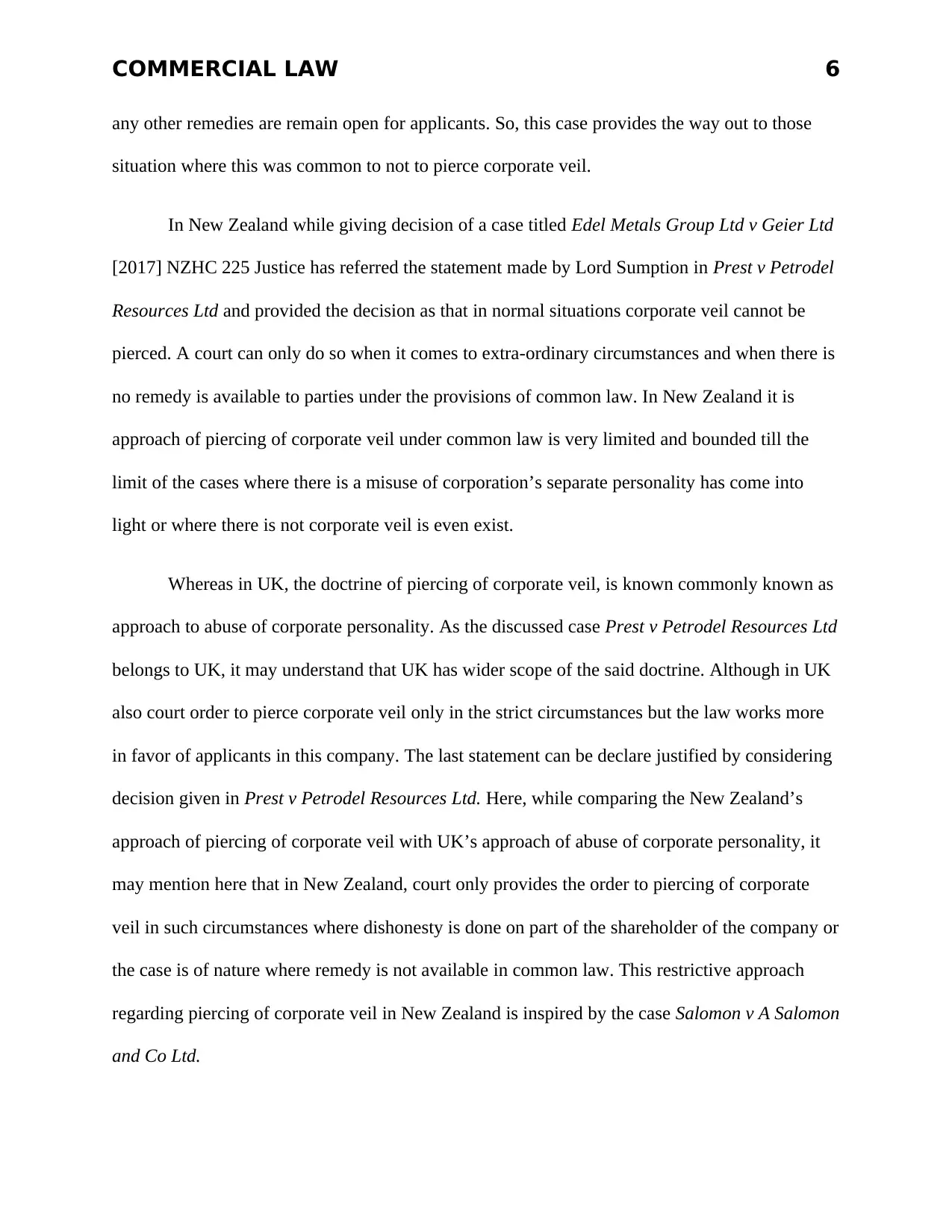
COMMERCIAL LAW 6
any other remedies are remain open for applicants. So, this case provides the way out to those
situation where this was common to not to pierce corporate veil.
In New Zealand while giving decision of a case titled Edel Metals Group Ltd v Geier Ltd
[2017] NZHC 225 Justice has referred the statement made by Lord Sumption in Prest v Petrodel
Resources Ltd and provided the decision as that in normal situations corporate veil cannot be
pierced. A court can only do so when it comes to extra-ordinary circumstances and when there is
no remedy is available to parties under the provisions of common law. In New Zealand it is
approach of piercing of corporate veil under common law is very limited and bounded till the
limit of the cases where there is a misuse of corporation’s separate personality has come into
light or where there is not corporate veil is even exist.
Whereas in UK, the doctrine of piercing of corporate veil, is known commonly known as
approach to abuse of corporate personality. As the discussed case Prest v Petrodel Resources Ltd
belongs to UK, it may understand that UK has wider scope of the said doctrine. Although in UK
also court order to pierce corporate veil only in the strict circumstances but the law works more
in favor of applicants in this company. The last statement can be declare justified by considering
decision given in Prest v Petrodel Resources Ltd. Here, while comparing the New Zealand’s
approach of piercing of corporate veil with UK’s approach of abuse of corporate personality, it
may mention here that in New Zealand, court only provides the order to piercing of corporate
veil in such circumstances where dishonesty is done on part of the shareholder of the company or
the case is of nature where remedy is not available in common law. This restrictive approach
regarding piercing of corporate veil in New Zealand is inspired by the case Salomon v A Salomon
and Co Ltd.
any other remedies are remain open for applicants. So, this case provides the way out to those
situation where this was common to not to pierce corporate veil.
In New Zealand while giving decision of a case titled Edel Metals Group Ltd v Geier Ltd
[2017] NZHC 225 Justice has referred the statement made by Lord Sumption in Prest v Petrodel
Resources Ltd and provided the decision as that in normal situations corporate veil cannot be
pierced. A court can only do so when it comes to extra-ordinary circumstances and when there is
no remedy is available to parties under the provisions of common law. In New Zealand it is
approach of piercing of corporate veil under common law is very limited and bounded till the
limit of the cases where there is a misuse of corporation’s separate personality has come into
light or where there is not corporate veil is even exist.
Whereas in UK, the doctrine of piercing of corporate veil, is known commonly known as
approach to abuse of corporate personality. As the discussed case Prest v Petrodel Resources Ltd
belongs to UK, it may understand that UK has wider scope of the said doctrine. Although in UK
also court order to pierce corporate veil only in the strict circumstances but the law works more
in favor of applicants in this company. The last statement can be declare justified by considering
decision given in Prest v Petrodel Resources Ltd. Here, while comparing the New Zealand’s
approach of piercing of corporate veil with UK’s approach of abuse of corporate personality, it
may mention here that in New Zealand, court only provides the order to piercing of corporate
veil in such circumstances where dishonesty is done on part of the shareholder of the company or
the case is of nature where remedy is not available in common law. This restrictive approach
regarding piercing of corporate veil in New Zealand is inspired by the case Salomon v A Salomon
and Co Ltd.
Paraphrase This Document
Need a fresh take? Get an instant paraphrase of this document with our AI Paraphraser
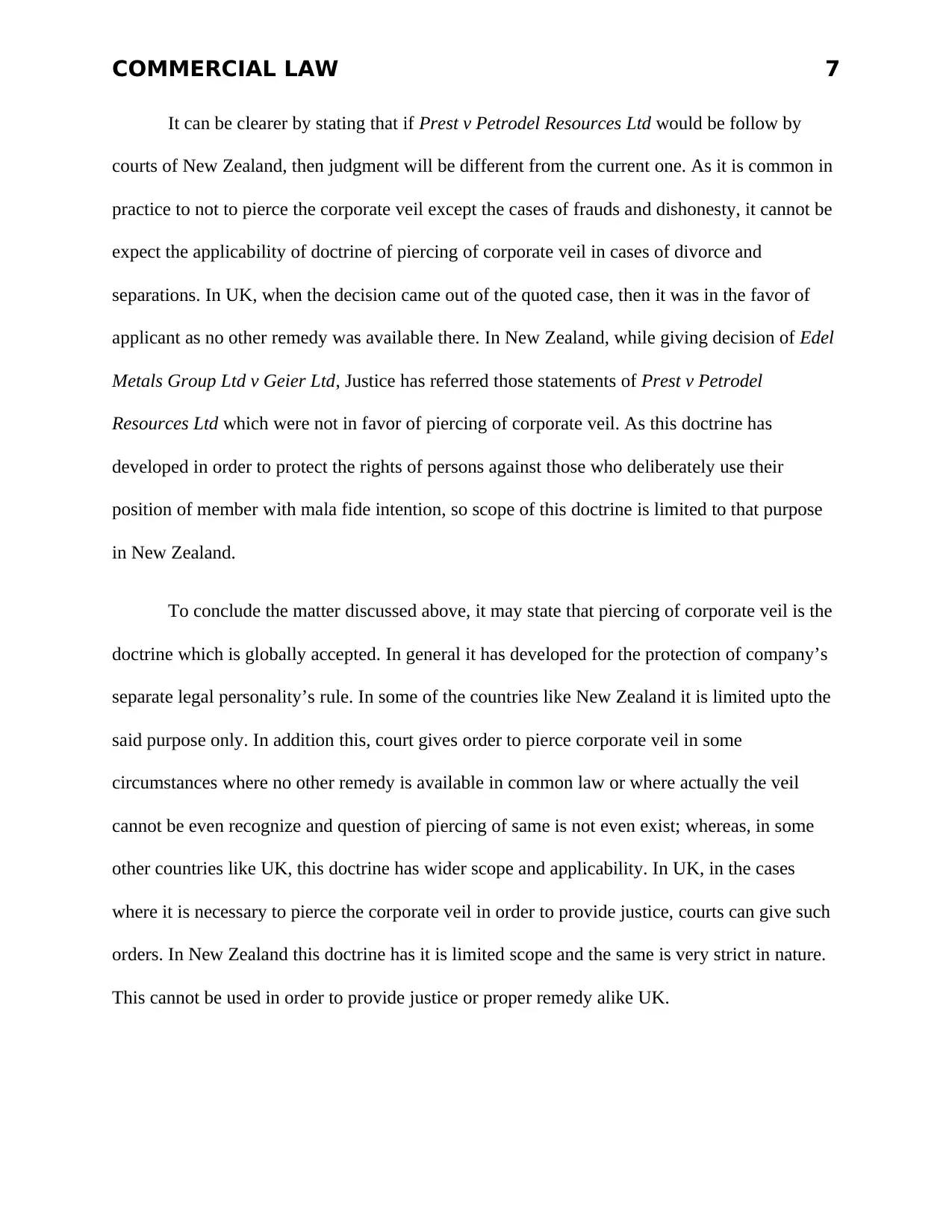
COMMERCIAL LAW 7
It can be clearer by stating that if Prest v Petrodel Resources Ltd would be follow by
courts of New Zealand, then judgment will be different from the current one. As it is common in
practice to not to pierce the corporate veil except the cases of frauds and dishonesty, it cannot be
expect the applicability of doctrine of piercing of corporate veil in cases of divorce and
separations. In UK, when the decision came out of the quoted case, then it was in the favor of
applicant as no other remedy was available there. In New Zealand, while giving decision of Edel
Metals Group Ltd v Geier Ltd, Justice has referred those statements of Prest v Petrodel
Resources Ltd which were not in favor of piercing of corporate veil. As this doctrine has
developed in order to protect the rights of persons against those who deliberately use their
position of member with mala fide intention, so scope of this doctrine is limited to that purpose
in New Zealand.
To conclude the matter discussed above, it may state that piercing of corporate veil is the
doctrine which is globally accepted. In general it has developed for the protection of company’s
separate legal personality’s rule. In some of the countries like New Zealand it is limited upto the
said purpose only. In addition this, court gives order to pierce corporate veil in some
circumstances where no other remedy is available in common law or where actually the veil
cannot be even recognize and question of piercing of same is not even exist; whereas, in some
other countries like UK, this doctrine has wider scope and applicability. In UK, in the cases
where it is necessary to pierce the corporate veil in order to provide justice, courts can give such
orders. In New Zealand this doctrine has it is limited scope and the same is very strict in nature.
This cannot be used in order to provide justice or proper remedy alike UK.
It can be clearer by stating that if Prest v Petrodel Resources Ltd would be follow by
courts of New Zealand, then judgment will be different from the current one. As it is common in
practice to not to pierce the corporate veil except the cases of frauds and dishonesty, it cannot be
expect the applicability of doctrine of piercing of corporate veil in cases of divorce and
separations. In UK, when the decision came out of the quoted case, then it was in the favor of
applicant as no other remedy was available there. In New Zealand, while giving decision of Edel
Metals Group Ltd v Geier Ltd, Justice has referred those statements of Prest v Petrodel
Resources Ltd which were not in favor of piercing of corporate veil. As this doctrine has
developed in order to protect the rights of persons against those who deliberately use their
position of member with mala fide intention, so scope of this doctrine is limited to that purpose
in New Zealand.
To conclude the matter discussed above, it may state that piercing of corporate veil is the
doctrine which is globally accepted. In general it has developed for the protection of company’s
separate legal personality’s rule. In some of the countries like New Zealand it is limited upto the
said purpose only. In addition this, court gives order to pierce corporate veil in some
circumstances where no other remedy is available in common law or where actually the veil
cannot be even recognize and question of piercing of same is not even exist; whereas, in some
other countries like UK, this doctrine has wider scope and applicability. In UK, in the cases
where it is necessary to pierce the corporate veil in order to provide justice, courts can give such
orders. In New Zealand this doctrine has it is limited scope and the same is very strict in nature.
This cannot be used in order to provide justice or proper remedy alike UK.
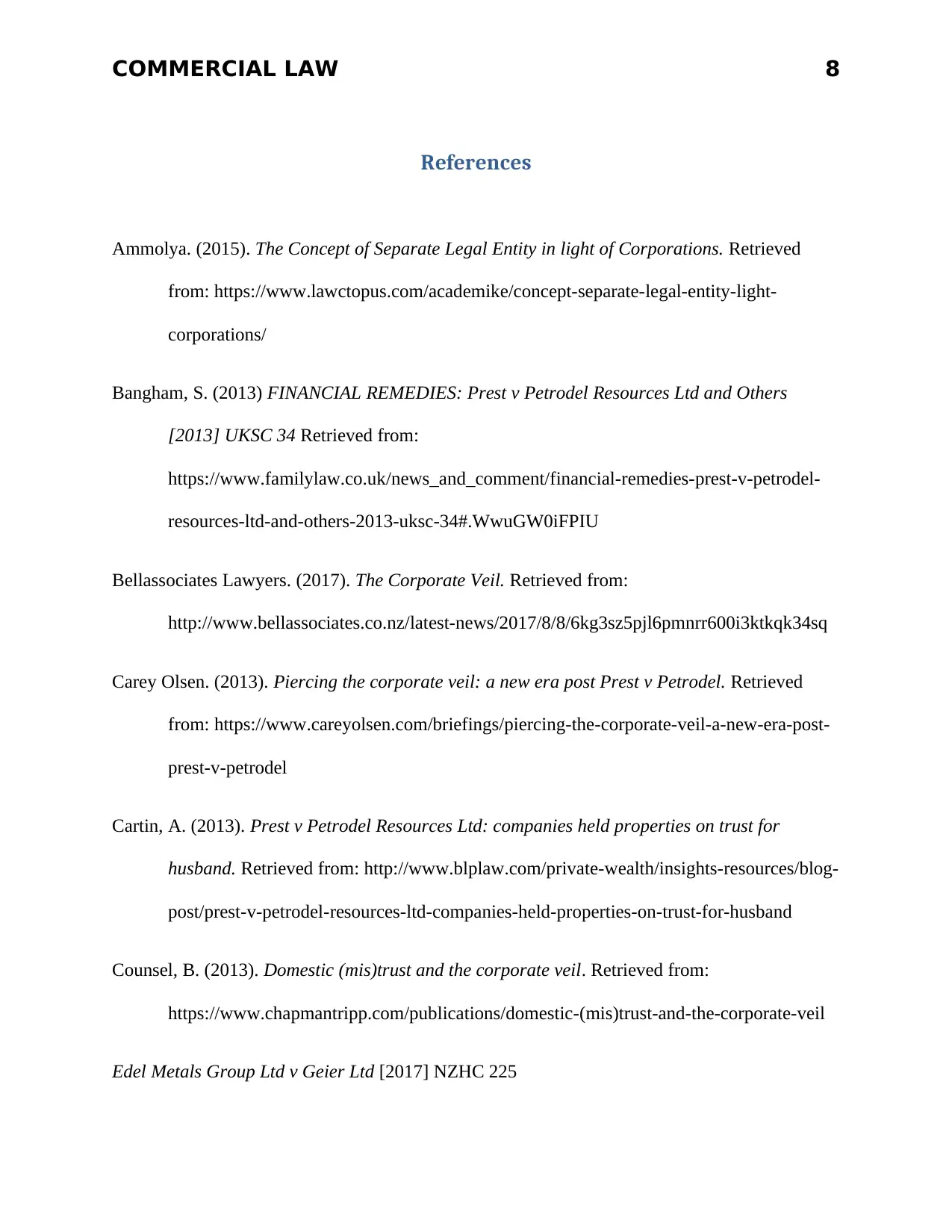
COMMERCIAL LAW 8
References
Ammolya. (2015). The Concept of Separate Legal Entity in light of Corporations. Retrieved
from: https://www.lawctopus.com/academike/concept-separate-legal-entity-light-
corporations/
Bangham, S. (2013) FINANCIAL REMEDIES: Prest v Petrodel Resources Ltd and Others
[2013] UKSC 34 Retrieved from:
https://www.familylaw.co.uk/news_and_comment/financial-remedies-prest-v-petrodel-
resources-ltd-and-others-2013-uksc-34#.WwuGW0iFPIU
Bellassociates Lawyers. (2017). The Corporate Veil. Retrieved from:
http://www.bellassociates.co.nz/latest-news/2017/8/8/6kg3sz5pjl6pmnrr600i3ktkqk34sq
Carey Olsen. (2013). Piercing the corporate veil: a new era post Prest v Petrodel. Retrieved
from: https://www.careyolsen.com/briefings/piercing-the-corporate-veil-a-new-era-post-
prest-v-petrodel
Cartin, A. (2013). Prest v Petrodel Resources Ltd: companies held properties on trust for
husband. Retrieved from: http://www.blplaw.com/private-wealth/insights-resources/blog-
post/prest-v-petrodel-resources-ltd-companies-held-properties-on-trust-for-husband
Counsel, B. (2013). Domestic (mis)trust and the corporate veil. Retrieved from:
https://www.chapmantripp.com/publications/domestic-(mis)trust-and-the-corporate-veil
Edel Metals Group Ltd v Geier Ltd [2017] NZHC 225
References
Ammolya. (2015). The Concept of Separate Legal Entity in light of Corporations. Retrieved
from: https://www.lawctopus.com/academike/concept-separate-legal-entity-light-
corporations/
Bangham, S. (2013) FINANCIAL REMEDIES: Prest v Petrodel Resources Ltd and Others
[2013] UKSC 34 Retrieved from:
https://www.familylaw.co.uk/news_and_comment/financial-remedies-prest-v-petrodel-
resources-ltd-and-others-2013-uksc-34#.WwuGW0iFPIU
Bellassociates Lawyers. (2017). The Corporate Veil. Retrieved from:
http://www.bellassociates.co.nz/latest-news/2017/8/8/6kg3sz5pjl6pmnrr600i3ktkqk34sq
Carey Olsen. (2013). Piercing the corporate veil: a new era post Prest v Petrodel. Retrieved
from: https://www.careyolsen.com/briefings/piercing-the-corporate-veil-a-new-era-post-
prest-v-petrodel
Cartin, A. (2013). Prest v Petrodel Resources Ltd: companies held properties on trust for
husband. Retrieved from: http://www.blplaw.com/private-wealth/insights-resources/blog-
post/prest-v-petrodel-resources-ltd-companies-held-properties-on-trust-for-husband
Counsel, B. (2013). Domestic (mis)trust and the corporate veil. Retrieved from:
https://www.chapmantripp.com/publications/domestic-(mis)trust-and-the-corporate-veil
Edel Metals Group Ltd v Geier Ltd [2017] NZHC 225
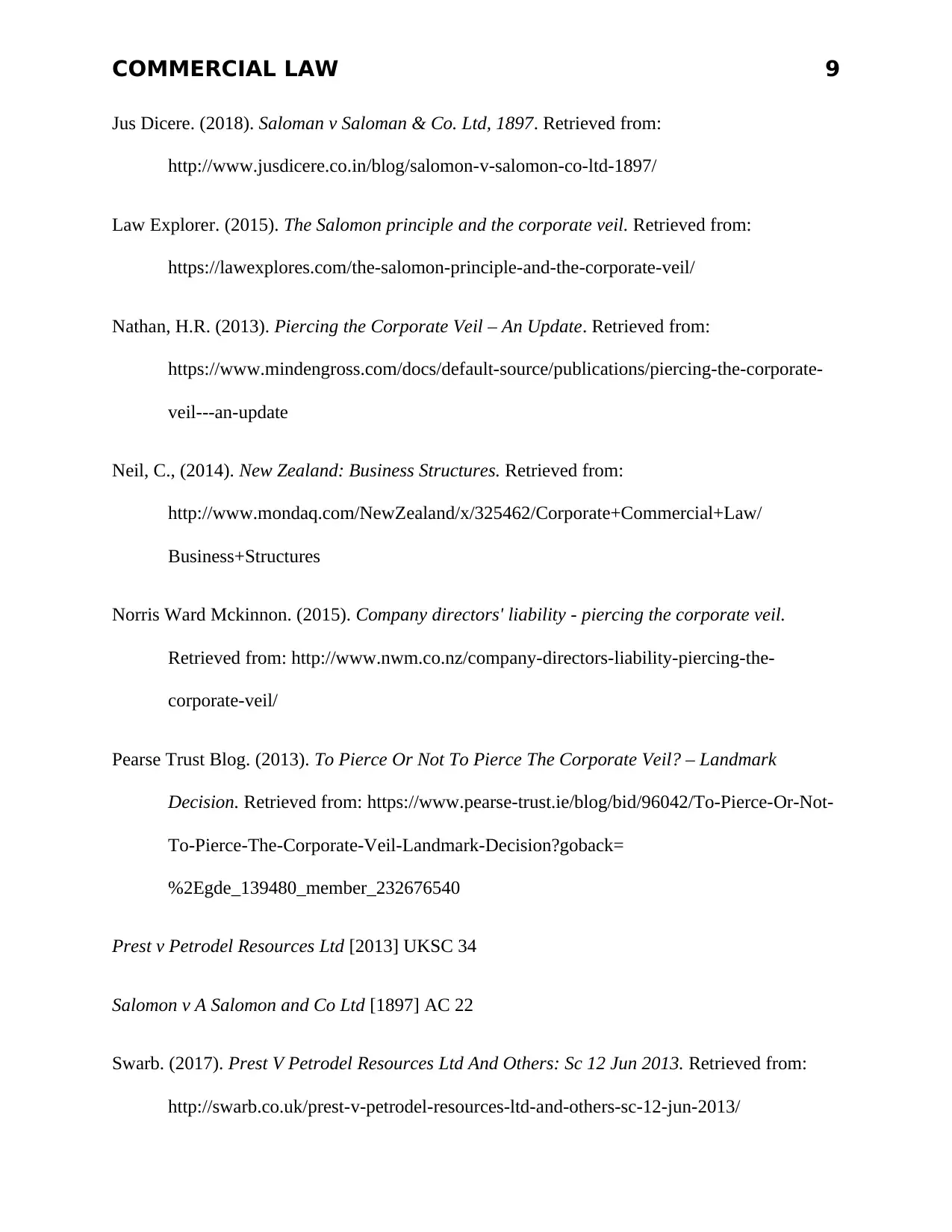
COMMERCIAL LAW 9
Jus Dicere. (2018). Saloman v Saloman & Co. Ltd, 1897. Retrieved from:
http://www.jusdicere.co.in/blog/salomon-v-salomon-co-ltd-1897/
Law Explorer. (2015). The Salomon principle and the corporate veil. Retrieved from:
https://lawexplores.com/the-salomon-principle-and-the-corporate-veil/
Nathan, H.R. (2013). Piercing the Corporate Veil – An Update. Retrieved from:
https://www.mindengross.com/docs/default-source/publications/piercing-the-corporate-
veil---an-update
Neil, C., (2014). New Zealand: Business Structures. Retrieved from:
http://www.mondaq.com/NewZealand/x/325462/Corporate+Commercial+Law/
Business+Structures
Norris Ward Mckinnon. (2015). Company directors' liability - piercing the corporate veil.
Retrieved from: http://www.nwm.co.nz/company-directors-liability-piercing-the-
corporate-veil/
Pearse Trust Blog. (2013). To Pierce Or Not To Pierce The Corporate Veil? – Landmark
Decision. Retrieved from: https://www.pearse-trust.ie/blog/bid/96042/To-Pierce-Or-Not-
To-Pierce-The-Corporate-Veil-Landmark-Decision?goback=
%2Egde_139480_member_232676540
Prest v Petrodel Resources Ltd [2013] UKSC 34
Salomon v A Salomon and Co Ltd [1897] AC 22
Swarb. (2017). Prest V Petrodel Resources Ltd And Others: Sc 12 Jun 2013. Retrieved from:
http://swarb.co.uk/prest-v-petrodel-resources-ltd-and-others-sc-12-jun-2013/
Jus Dicere. (2018). Saloman v Saloman & Co. Ltd, 1897. Retrieved from:
http://www.jusdicere.co.in/blog/salomon-v-salomon-co-ltd-1897/
Law Explorer. (2015). The Salomon principle and the corporate veil. Retrieved from:
https://lawexplores.com/the-salomon-principle-and-the-corporate-veil/
Nathan, H.R. (2013). Piercing the Corporate Veil – An Update. Retrieved from:
https://www.mindengross.com/docs/default-source/publications/piercing-the-corporate-
veil---an-update
Neil, C., (2014). New Zealand: Business Structures. Retrieved from:
http://www.mondaq.com/NewZealand/x/325462/Corporate+Commercial+Law/
Business+Structures
Norris Ward Mckinnon. (2015). Company directors' liability - piercing the corporate veil.
Retrieved from: http://www.nwm.co.nz/company-directors-liability-piercing-the-
corporate-veil/
Pearse Trust Blog. (2013). To Pierce Or Not To Pierce The Corporate Veil? – Landmark
Decision. Retrieved from: https://www.pearse-trust.ie/blog/bid/96042/To-Pierce-Or-Not-
To-Pierce-The-Corporate-Veil-Landmark-Decision?goback=
%2Egde_139480_member_232676540
Prest v Petrodel Resources Ltd [2013] UKSC 34
Salomon v A Salomon and Co Ltd [1897] AC 22
Swarb. (2017). Prest V Petrodel Resources Ltd And Others: Sc 12 Jun 2013. Retrieved from:
http://swarb.co.uk/prest-v-petrodel-resources-ltd-and-others-sc-12-jun-2013/
Secure Best Marks with AI Grader
Need help grading? Try our AI Grader for instant feedback on your assignments.
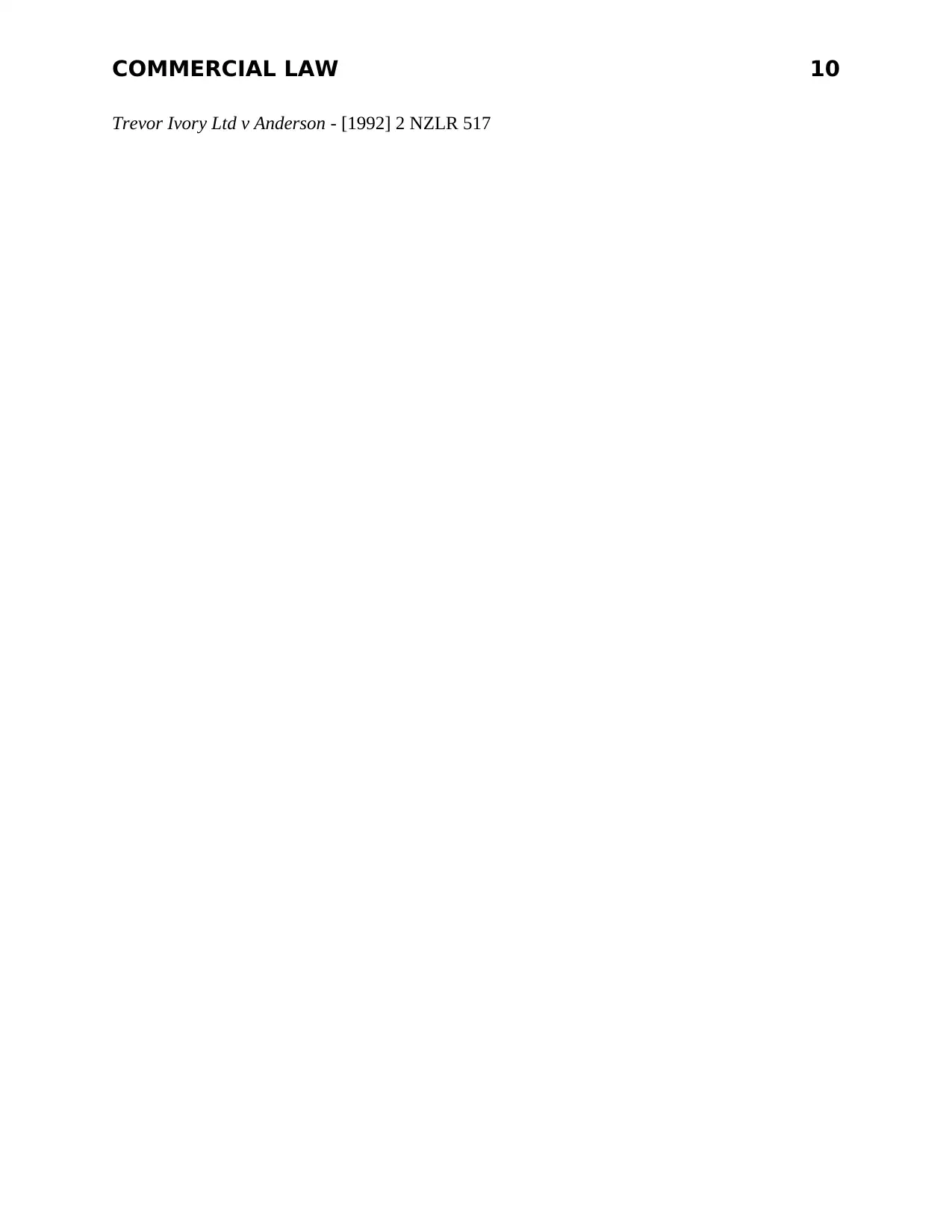
COMMERCIAL LAW 10
Trevor Ivory Ltd v Anderson - [1992] 2 NZLR 517
Trevor Ivory Ltd v Anderson - [1992] 2 NZLR 517
1 out of 11
Related Documents
Your All-in-One AI-Powered Toolkit for Academic Success.
+13062052269
info@desklib.com
Available 24*7 on WhatsApp / Email
![[object Object]](/_next/static/media/star-bottom.7253800d.svg)
Unlock your academic potential
© 2024 | Zucol Services PVT LTD | All rights reserved.




